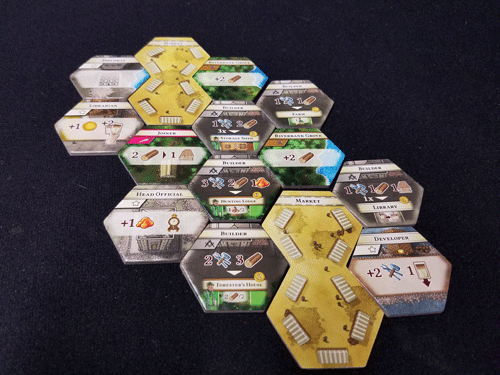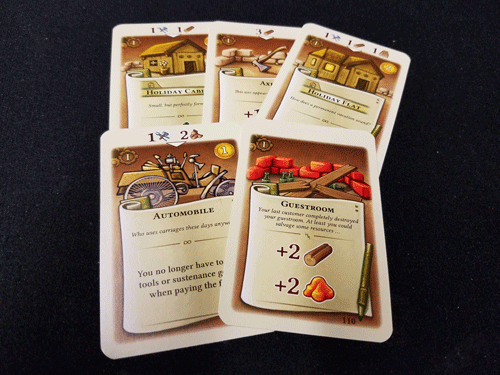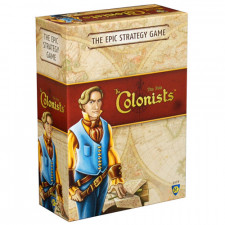The Colonists Review
on Feb 8, 2017
Colonists, somewhat surprisingly, has very little to do with colonization. Instead, each player attempts to grow their own little community. The players are not the colonists. Instead, they can establish relationships with various colonies in order to gain special powers and abilities.
Play can take you through up to four eras. You decide how many you want to play at the start. In each, there are five years and players act twice in each year. You can build new buildings – which must be staffed with workers if you want the buildings to operate – draw and play improvements, gather resources, and even create upgrades. At the end of each year, your production buildings produce and you have to store the associated goods or lose them.

Another game that was probably prototyped on repurposed Settlers hexes.
The game starts with a relatively small board of hexes placed by the players. Each hex provides a particular action and, from turn to turn, you move your steward around taking the actions that benefit you most. As the game continues, though, more and more hexes get added. And, typically later hexes are more powerful or give access to better buildings – though they tend to be on the edge of the board and less accessible. At game end, you count up points earned during the game, points for constructed buildings, and points for employed workers. The player with the most wins.
There is very little novel or unique about Colonists. It introduces no new major mechanisms and pretty much all of it feels vaguely familiar. I’ve gathered and upgraded resources before. And I can’t tell you how often I’ve placed workers in buildings. But the game combines it all in a way that feels interesting and engaging. In fact, one notable accomplishment is that it achieves surprising flexibility within its framework.
The central hex board is a critical spatial element with which players must wrestle. Pawns can initially only move one space at a time. This means that the game will be different if, for example, the Clay Pit is next to the Brick Burner (which needs clay) or if those two spaces are further apart. The First Player gets to add three new hexes each year – which can really impact which strategies might be more or less successful.
Also important is that when you go on a particular hex, you can use that ability as many times as you want – as long as you can pay the cost. This layers a new consideration over the game as you want to make the best use of your actions. You don’t want to return to the same place three times when you can go just once and use those extra actions for other stuff.
Still, it would be a relatively pedestrian get-goods-exchange-for-other-goods type game were it not for the colonies. Out of a total of nine, only four or five will be used in any given game. Players can build embassies to the available colonies and, as they do, they gain special abilities. Examples include the Trader colony which allows you to exchange resources at a market, the Storekeeper colony which helps you hold on to more goods, and the Lord colony which even lets you avoid paying required fees.
While it can be tempting to build relations with all four colonies, you simply don’t have time or resources to do so. Like many euro-style games, the goal is to get your economic engine tuned up and then run it for points and profit before the game ends. Spend too much time building the engine, and you’ll have precious little time for actually reaping its benefits.

But apparently you'll have enough time for holiday flats and cabins!
Mechanically, the colonies provide special powers that are available to each player if they spend the resources to acquire them. Players who start off strictly even become increasingly asymmetrical in their abilities and desires. Heck, as you get into the special powers, the same hex might be more or less desirable depending on how players can combine that with the colonies.
One of the best aspects of Colonists, though, is the flexible playtime. You can play through all four eras and have an amazing, epic experience. You see your little settlement grow and thrive and you watch as farmers become citizens, and eventually merchants. You can spend several hours in the full game, and it’s time well spent. But, maybe you want something a little shorter. Well, the game allows you to play only select eras. Playing one or two results in much less play time and you still get to enjoy the main thrust of the experience.
Put it all together and Colonists is a solid title for people who like epic efficiency games. And if you’ve got players in your group who prefer something shorter, the game can accommodate. For any heavy euro fans, this is definitely a title to try.

 Customer Support
Customer Support  Subscribe
Subscribe 




 Account
Account  Wishlist
Wishlist 

